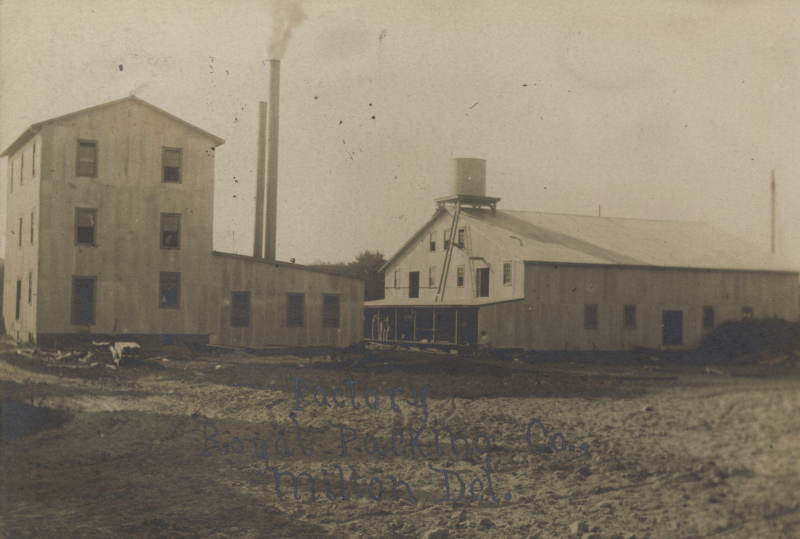Royal Packing Co. thrived in downtown Milton
Royal Packing Company was once a prominent feature of downtown Milton. Standing in the area of the M&T Bank now at the corner of Union, Federal and Front streets, the original canning factory was destroyed by a disastrous fire in August 1909.
According to reports, the night watchman at Royal Packing Co. discovered the blaze around 1 a.m. Firefighters responded, aided by residents, but they couldn’t contain the fire, and it spread to other buildings. In total, 18 buildings burned in the downtown area.
Despite rebuilding, the Royal Packing Co.’s tomato- and pea-packing factory was destroyed in another fire in 1911. According to a June 7, 1911 article in The Evening Journal, 16 carpenters erected a new 100-by-81-foot canning house for Royal Packing Co. over an eight-day period. Just days later, operations commenced, running day and night through the pea season.
According to a June 10, 1912 article in The Evening Journal, pea canning was one of Milton’s most important industries of the time. In Milton, H.R. Draper’s factory and the Royal Packing Co. employed about 200 men, women and children.
The fate of Royal Packing Co. is told, of all places, on the website of The Mansion Farm Inn, a bed and breakfast on Route 16 east of Milton, as its history is ostensibly intertwined with Royal Packing Co.
According to the site’s history, the son of the founder invested in Royal Packing Co. John Robbins borrowed $10,000 from Delaware Trust Bank. He then loaned the money to Royal Packing Co. in 1920. But by that time, the cannery was already struggling to make ends meet.
During World War I, there was a shortage of tin cans. Reports indicated that there weren’t enough railroad freight cars – due to wartime prioritization – to transport tin plate from Pittsburgh to the seven can factories in Maryland, which were the only suppliers of cans to Delaware canneries. Then in 1919, the supply of tomatoes available to the canneries was cut drastically when growers wouldn’t enter into futures contracts until their high price demands were met. That resulted in canned tomato production falling more than 80%. The final nail in the coffin was a series of strikes by industrial and railroad workers from 1919 to 1921.
By 1921, Royal Packing Co. closed its doors and was acquired by Delaware Trust Co. The bank then sold the factories to J. Oliver Hazzard and John P. Wilson, who remodeled and reopened the factories a few months later.
In addition to peas and tomatoes, Royal Packing Co. experimented with canning sausage in 1907. According to an article in the Smyrna Times, the factory took up the task at the request of private citizens who claimed canned sausage would be more palatable and would lose its “superfluous richness.”






















































